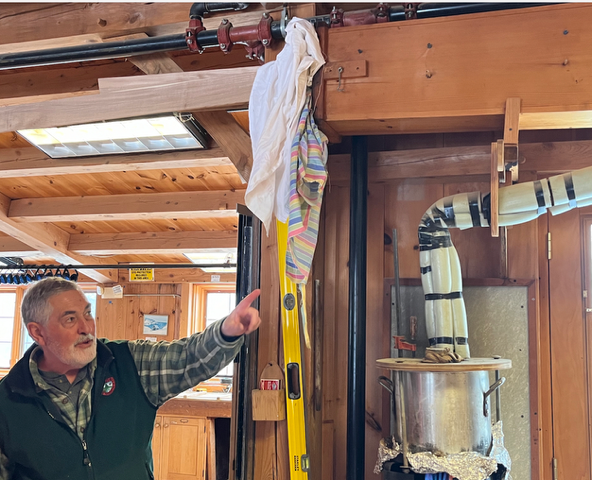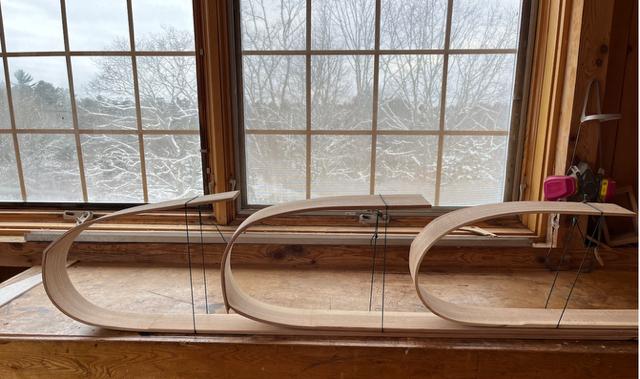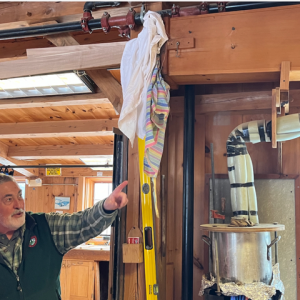How the Boat Shop (briefly) became a toboggan shop
When the late-March snowstorm slammed into Maine, a small group of students at Maine Academy of Natural Sciences (MeANS) were prepared. Should a quirky springtime blizzard interrupt their April or even their May, they’ll be ready.
The reason for their confidence? The two days in February they spent at the Carpenter’s Boat Shop not just learning how to build a toboggan (day one) but actually building one of the large wooden sleds, strapping it on the roof of their car, and delivering it back 70 miles to the Hinckley, Maine, campus.
That trip began in late September 2023 at the Common Ground Country Fair in Union. MeANS had a table adjacent to a Boat Shop table. As a good neighbor, Alicia Witham, Boat Shop executive director, started chatting with Jeff Chase, MeANS agricultural specialist, and Danni Best, the school’s alumni affairs/administrative support director (and previous dean of students).
“We started talking about education and collaborating,” Witham recalled. “When educators can get together and collaborate, the only thing that happens is excellence because we all get to learn from each other. We put a program together over a few emails.”
The starting points: Apprentices are the Boat Shop’s primary focus nine months a year. But that leaves three months when the Carpenter’s can address other needs and services. In the winter off-season, Witham, Chase, and Best agreed to focus on a cold-weather project.
“We all said, ‘Let’s build a toboggan,” Witham continued. “Let's incorporate some human history, some math, science, and some creativity into it.” Because the Boat Shop had not just the woodworking tools and shop space but also bedrooms and kitchens, “We decided to do a residential visit, so Jeff and Danni didn’t have don't have to drive back and forth from the school.”
The additional benefit of an extended stay: “So much wonderfulness happens” away from the actual projects. So, we ate dinner together. After the first day’s work, we had a bonfire. Everybody was up for breakfast the next morning at seven and back in the shop.”
Maine Academy of Natural Sciences, explained Chase, is Maine’s first public charter high school for students. Its mission? To inspire and engage students through project-based, student-centered instruction immersed in the natural sciences of Maine with a focus on agriculture, forestry, and the environment.
“Alicia and I thought about how we might be able to do something at the Boat Shop, so I wrote a grant to the Environmental Education Association. The good news: Funding to cover the two-day overnight expedition to Carpenter’s.
Said Chase, “Whenever we have opportunities to teach kids something that's above and beyond what the traditional school offers, it's great. A kid might not understand the concept of some type of woodfibering for science class, but when he sees it in practice, it sticks with him.”
The potential of the toboggan project echoed the kind of hands-on instruction that shapes MeANS’ student engagement. At the school, kids learn about growing in greenhouses, about maple sugaring, about beekeeping, said Best.
Best accompanied Chase on the trip to Pemaquid and explained, “Just to be able to walk out to the greenhouses to see what you're growing. Or to boil the SAP and make the syrup. Or to be a part of something, using your hands, spending time with people who are interested in building that relationship gives our students opportunities that they would never have. It's just phenomenal.”
Carpenter’s Boat Shop’s renown is building boats, not sleds. But Witham is nothing if not resourceful. And she knew she had the resources to get the toboggan job done.
Thirty years ago, while Ken Elowe worked with the Department of Inland Fisheries and Wildlife, he spent nights and weekends building and restoring wooden boats. “Someone asked me,” he recalls, ‘Can you build a toboggan?’”
Elowe, who recently retired from a 23-year stint on the Boat Shop board but still shows up at the Pemaquid as a volunteer/instructor on a variety of projects, welcomed the challenge. He pulled an old book from his shelf—a tome rich in colorful illustrations and hands-on instructions—and set to work teaching himself how to adjust his boat-building knowledge to constructing an entirely different kind of craft.
Once he’d mastered the form of the form of the snow sled, the word spread about his new skill set and “one year, I built more than 22 toboggans.”
When a group of MeANS students and two staff members arrived at the Boat Shop, Elowe had jerry-rigged a steam-driven wood-bender: Heated water was piped going up to a long wooden crate that contained strips of wood. Critical to the process is a delicate balance of not providing too much pressure but generating enough steam to get wood hot and wet to the point where the cell structure of the planks changes.
Elowe told the MeANS visitors that proper streaming would take between 20 and 30 minutes (depending on the thickness of the boards) before the process of reshape the pliable wood could begin. And, at that point, there’s a small window—a minute or less when the heat and steam cut off—to bend the wood into something that begins to resemble a toboggan.
Elowe still uses the ’50s handbook to inform his MeANS audience. But he’s been working at the art of toboggan-building long enough to realize, “It’s as much an art as a science.”
Even as the kids from MeANS learned the tobogganing basics, Boat Shop instructors sat in on the lessons with the plan to bring Ken Elowe’s teachings to a larger audience. “Our instructors had a chance to learn from Ken,” Witham said, and, with some additional study, they’ll be able to lead open-enrollment classes for even larger audiences.
In fact, over and above its core apprenticeship initiative. The Boat Shop this year will have 13 open-enrollment classes—some of them paid, others on “donations-welcome” basis. The upcoming events include Coastal Navigation Class with Arista Holden (May 17-19, $350); Summer Skiff Building with Bobby Ives (June 17-21, $875); Driftwood Creative Class with George Ingram (July 5, “donations welcome”; Driftwood Creative Class with George Ingram (August 23, “donations welcome”); and Women’s Woodworking Week with Lizabeth Moniz (August 26-30, $875).
It’s a deliberate effort, Witham explained, “not just to be more inclusive and more welcoming, but the classes are a great opportunity to let people know they can come here and experience the joys of this place.
“We’re reaching out to organizations and asking, ‘How can we work together to create programs? How do we come together to create a class that is relative to living as a person in Maine?’ And now we're teaching them how to bend wood. This might sound really simple, but it's a very specialized skill.
“The whole vision of sharing this campus as broadly as possible is gaining traction,” she added, one toboggan at a time.
For more information about the Carpenter’s Boat Shop, and its open-enrollment classes, email director@carpentersboatshop.com, log onto carpentersboatshop.org, or call 677-2614.




























